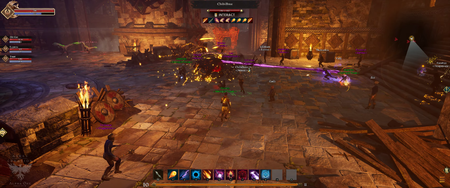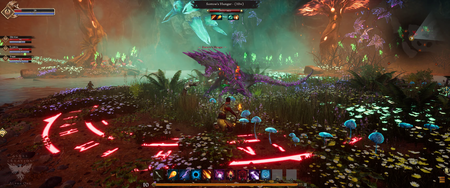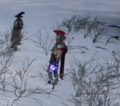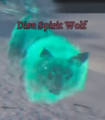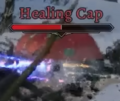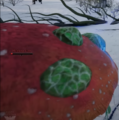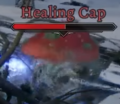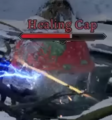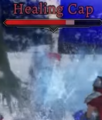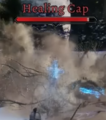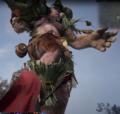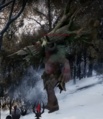Encounters
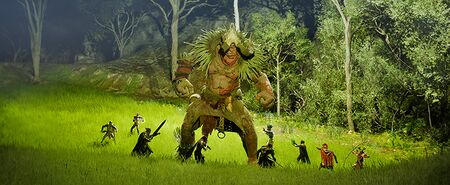
Raid bosses are aware of the number of combatants within an area in proximity to them and that awareness is part of an indicator to which behaviors they're going to utilize as part of their behavior tree. So as it's assessing the types of combatants that are facing it, the number of those combatants, the position of those combatants, the abilities and totals of those combatants, it weighs certain actions in its behavior tree and then it acts on those actions; and in the scenario where you're bringing overwhelming odds to a particular fight, that might weigh heavier the AoE options that the boss has access to, where they're utilizing a lot more AoE abilities during an engagement due to that overage of of players. So in that sense it's a bit adaptive. It's a bit dynamic based on the encounter scenario.[2] – Steven Sharif
The difficulty of PvE content, such as raids and dungeons will adapt based on the performance of the raid or group against previous bosses in that encounter.[3]
- Higher performance in earlier phases will increase the difficulty of subsequent phases of the encounter.[3]
- Certain AI behaviors might activate based on progress within an encounter.[2][4]
- Bosses and mobs will not auto-scale based on group size, but AI behaviors may dynamically adapt to the number and types of combatants in proximity to the encounter.[2][5]
- Both in Alpha-2 and when the game launches, there will be monsters whose technical level is above that of the cap; and the intent there is obviously again to provide some level of challenge that exceeds a comparable level challenge rating.{livestream|2023-11-30|1h53m50|V9F_AJl9ozY}} – Steven Sharif
- The higher the difficulty, the better the loot tables will be.[3]
- Q: How challenging will raid boss mechanics be given the given that players may need to simultaneously fight other players while also fighting the boss?
- A: It depends. The great thing about our encounter system is that it has a wide scalability from encounters that some might consider easy given their composition to encounters that some might consider impossible until they get their gear level to a certain stage. The level of interaction with other players is really predicated on the encounter itself. We may have some encounters that are in instances although the predominant portion of those will be in the open world, in which case they do have the potential being contested; and these encounters, especially the big ones that might land in contention, are giving some of the best-in-slot gear you can get in the game. So it's important that they are contested because it is a significant victory point; and one of our core pillars is risk versus reward: and the higher that risk the higher that reward should be. So those two things seem fitting and then in addition we do have the concept of winners and losers. Not everybody in Ashes of Creation is going to be a winner; and that sucks if you're not I guess, but there is opportunity for you to continue to excel and become one. But it gives much more meaning to an achievement when not everybody gets the achievement. That's our philosophy.[7] – Steven Sharif
- Q: So it's the sort of thing where it might be, we're going do a dungeon that's oops, all fire golems, so if everybody straps up with plate armor and fire resistance, you don't have to worry about the magic fire: you've got the fire resistance for. And when you start getting punched around, that's why everyone's come in with plate?
- A: The encounters design team presents a particular type of challenge rating- for those you're familiar with playing DnD or whatever, challenge rating gets informed by a few different vertical power levels, but then there's also the horizontal perspective: That is, what tools does your party have to address the challenge rating of the situation and some of the horizontal progression exists within how you kit your equipment slots. Some of those can be enhancements or stones, as you're discussing with fire resistance. Some of those are base stats that exist on a particular item, such as physical damage mitigation versus magical damage mitigation and what subtype of damage is incoming based on that. These are the ways that we emphasize that more rock-paper-scissors type of interaction with balance to where it's okay to have asymmetric imbalance if there are horizontal methods by which you achieve the challenge rating.[8] – Steven Sharif
Ashes of Creation will be easy to understand yet hard to master.[9]
- My stance on participation trophies is that things should be hard, people should fail, the bitter taste of defeat is what makes success that much more rewarding. Helping other players learn encounter strategy, and fine tuning their play style for high end content is an important part of eliminating participation trophy. Growing together is a good thing, and that include failing together as a means to drive for success together.[10] – Steven Sharif
Meta
A goal of Ashes of Creation is to emphasise micro metas that work for specific encounters, and de-emphasize macro metas that work for everything.[11]
- What we're doing with this approach is we're de-emphasizing a macro meta and instead emphasizing a micro meta. And the difference between the macro/micro is that on the micro level you have metas that might form based on each individual type of encounter or experience. And in those senses, yes, there's going to be a most optimal: There's going to be a best in slot. There's going to be whatever that pertains to that particular challenge rating. But there won't we there will not be an overarching meta that says from a macro level, hey, if you got this shit, you're good to go for everything. That's boring, that's unfulfilling, that is not interesting; and it is just something that that dumbifies the experience.[11] – Steven Sharif
- The effectiveness of classes, skills and gear is going to depend on the adversary or the encounter. There will be optimal builds for different challenges and difficulty ratings. This design aims to avoid any obvious meta or "cookie-cutter" builds in Ashes of Creation.[11][12]
- Different challenges are presented dynamically to players based on node progression and destruction. Situations that are based on a rock-paper-scissors design will inspire a horizontal gear chase. These dynamic challenges will change from month to month, causing a shift in demand in the economy as different builds are required by the new content.[12]
- Increasing difficulty ratings inspire more of a traditional vertical power progression that is common in other MMOs.[8][12]
- Oftentimes you just have a very vertical power scale and that determines chase, but when you have a variety of relevance across certain types of adversaries and that variety changes over time because of player activity- and then that affects the economy and the crafter system and who was producing what for what demand- and everything gets shaken up. That's a very fun environment to exist in. It presents a more dynamic situation rather than a quote-unquote cookie-cutter type selection.[12] – Steven Sharif
- The intricacies of how nodes interact with predicates in the world means that it may be possible but difficult to achieve meta server builds.[13]
- Q: Do you have any concerns on players eventually discovering a meta server build with nodes due to players heading to specific nodes and regions because they find that content more enjoyable; and if so how would you go about getting players to shift around the world to break up the meta?
- A: I think it's interesting if players have a concerted effort across a server to interact with one another, learn from their actions, mistakes, successes, and effectuate that on the server. That's interesting, but I don't believe we'll see a meta form. I think that the intricacies are too great when it comes to how predicates are formed in order to elicit world state changes.[13] – Steven Sharif
Best-in-slot items
What is considered best-in-slot is based on a character's role and the type of encounter they are facing.[11][14]
- Crafted items are best-in-slot in Ashes of Creation.[15] Previously it was stated that crafted items will be on-par with best-in-slot items.[16]
- Instanced content will contain scripted and difficult boss fights that drop gear, but the gear drops will not be best-in-slot. These can only be found in the open world.[17]
Game balance
The way that the systems are being designed from a balancing standpoint we're taking into account how we would like the nodes to change per-se how often and we've designed attrition systems for certain cultures that may have more dominance over others. These are things that in Alpha and Beta we will be testing and watching and making sure that our objective is achieved from a gameplay standpoint and if it's not we'll come back and recalculate.[18] – Steven Sharif
Class balance
- Balancing in Ashes of Creation is group focused not based on 1v1 combat.[19][20][21]
- 1v1 matchups will have a rock-paper-scissors dynamic, where one class will be superior to another.[19][21]
- There will be match ups in 1v1s where one class will be superior to another; and that application should be a rock-paper-scissors dynamic. We want there to be counter-play between the different classes... Instead it's going to be a group focused balance, where as long as you have the diversity of classes present, that's going to be an equal level playing field. It's going to be very dependent on skill and strategy.[21] – Steven Sharif
- Balance-wise, there's a number of different interactions mechanically that you have within an ability that you can adjust in order to balance its power. The most most common ones are: Cooldown, Mana consumption, Damage done, Effect status conferred, Promotion of that effect status, Range.[22] – Steven Sharif
- Alpha-1 testing was focused on core functionality rather than combat balance.[23]
- Alpha-2 testing will begin to focus on balancing once populations and encounters have been put in place and are deep in testing.[19][24]
- When we move into Alpha 2 and we have a lot of data that's supporting the use of these particular abilities in combat settings, how often they're used, how often they result in death, what the average damage done by this archetype is comparatively to other damage done by different archetypes: All of that data gets logged and all of that data gets queried in order for us to refine the abilities so that they live in the environment we want them to. Now, that's not to mean that we're going to have a perfect balance across the board between the archetypes. Again, we're taking a rock-paper-scissor approach to balance, which means that some archetypes will do better against other archetypes and vice versa; and we're also not creating an environment where we want to have 1v1 balance. We are focused around group balance. Group composition is important.[19] – Steven Sharif
- The sixty four (64) classes are partitioned into eight primary archetypes. Balancing of active skills only relates to these eight primary archetypes.[20][25]
- Certain secondary archetypes are capable of "bridging the gap" between their counterpart.[30]
- Even though augments do radically change the way your active skills provide you abilities, there's still a primary focus on the base archetype itself and not the 64 whole classes.[20] – Steven Sharif
- Certain archetypes are capable of moving the gap between their counterpart per-se. If I am a Tank archetype and a Mage is my counter, I can take a Mage secondary and bridge the divide slightly; and then move my identity that direction ever so slightly.[30] – Steven Sharif
Dungeons
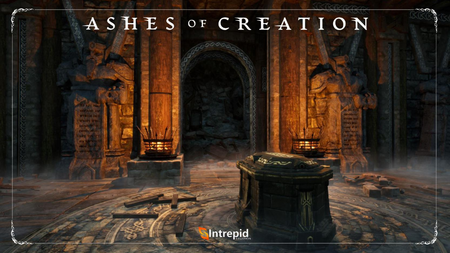
Half the problem won't just be solving the dungeon, it will be solving other players too.[32] – Jeffrey Bard
Dungeons in Ashes of Creation will range in size and will be mostly open-world.[35][36]
- Open world dungeons will be populated to facilitate multiple groups within the dungeon.[32]
- Instanced dungeons will also be present and will cater for solo and group questlines.[32]
Different tiers and types of dungeon content will be more or less relevant to specific groups or class compositions.[39]
- There are going to be smaller, simpler, linear dungeons. There's going to be bigger, more complex, nonlinear dungeons. So, It's a little bit of both. We want the environment to be a character. In order for the environment to be a character, these places need to be interesting and there needs to be a dynamicism to them.[35] – Jeffrey Bard
Dungeon difficulty will increase the further a player ventures into the dungeon.[40]
- Mobs and mob mechanics will become more difficult.[40]
- Terrain and environmental dangers will increase.[40]
- Deeper darker types of interactions will be found deeper in the dungeon.[40] – Steven Sharif
There were 13 dungeons in Alpha-1.[41] Originally this was estimated to be 6 or 7.[42]
List of dungeon bosses
| This section contains potentially outdated information from Alpha-1 testing. |
List of notable dungeons
| This section contains potentially outdated information from Alpha-1 testing. |
- Breaker's Penitentiary
- Cerulean Grotto
- Deepheart Cove
- Drythorne Gulch
- Dünheim
- Dünzenkell Crypt
- Fallow's Hold
- Hungering Maw
- Illwind Ruins
- Manaspring Hollow
- Ruins of Restless Spirits
- Sporelight Caverns
- The Tower of Carphin
- The Underroost
- Underrealm Entrance
- Volcano dungeon
Raids
Raids will either be based on triggered events or more traditional systems. Traditional world bosses will change based on node development.[45]
- We want things to be more fluid and one of the ways that we make them more fluid is through our triggered event system. That is one of the methods by which we make these more spontaneous. We make them more accessible to a wider audience. You can be just in the city and not normally be a part of a raid team, but now get to participate in this organic event that's popped up around the city and if you are not participating then buildings are gonna get destroyed and NPCs are going to die... It's not just how fast can we do it, how will we get it done in its schedule, but oh my god this thing popped up if we don't kill it we're not going to access to our stables this week and we can't get our animal husbandry certificates... It's that risk versus reward that gives you a sense of adrenaline.[46] – Steven Sharif
List of raid bosses
| This section contains potentially outdated information from Alpha-1 testing. |
- Brood Queen
- Elder Dragon of Flame
- Elder Dragon of the Tundra
- Elder Dragon of the Wood
- Negalith
- Tumok the Wretched
Raid strategies
Raids will have elements that can be pre-planned.[47]
Raids will also have dynamic elements that can change from session to session.[47]
- The types and numbers of bosses and mobs present in the raid and their skill repertoire.[47]
- Variables are manifested based on node progression.[47]
- The number of metropolis nodes developed.[47]
- The types of metropolis nodes developed.[47]
- One of the design elements that we're implementing into our raids is that the raid will not be exactly the same every single time. You're going to have variables that can't necessarily be pre-planned out for. You can pre-plan out for a lot of the raid like how many DPS do you need and healers and support; where the key position and all that stuff; but I think the compelling aspect of Ashes raiding will be the difficulty in achieving this content and having that content change from session to session as well. We want there to be variables that get manifested by what type of node got developed elsewhere. Is he going to have acolytes or cultists? What will the acolytes have skills [available] to them? What kit is the boss gonna have? What available skill repertoire will the boss be able to [wield]? ... A lot of those systems are influenced obviously by world development. So the raid takes into account at what stage has the world developed: Are there two metropolises now available in the world? Okay well let's activate this skill in this skill. Now you have five metropolises, well now all these skills have been activated. Are there are they all economic nodes? Are they all military nodes? That we can change things based on that stuff. And it really is a threat assessment from the environment against the players.[47]{{ndash|Steven Sharif}
World bosses
- World bosses will spawn at variable locations at variable times.[49][50][51]
- The general philosophy is that respawns will be variable. We don't want to have set specific times in which respawns will occur, so that they can be camped and farmed. But there'll be variable location respawns as well as variable time respawns. And then that provides opportunities for different parties to engage at different times and locations.[50] – Steven Sharif
- World and regional bosses will scale based on the types, locations, and progression of nodes.[53][54]
- World bosses will not scale to adapt to player levels.[53]
- Some world bosses will have stages of progression, such as defeating acolytes, then lieutenants, then generals, then the world boss itself.[55]
- At each stage there is increasing difficulty. This may be parsed out into different time periods and be behind a wall of development.[55]
- A single digit percentage of the population will be capable of defeating certain content.[55]
- There will be ancillary effects that happen as a result of downing certain world bosses.[56]
- This can positively impact the land management in that area.[57]
- Around 80% of the content is open-world, where healthy competition is an instigator for player friction; for potential cooperation; for the ability to yield alliances; and the political theater that comes with it. This is an intended part of the PvX design of Ashes of Creation.[58][59][60][61][62]
Monster coins
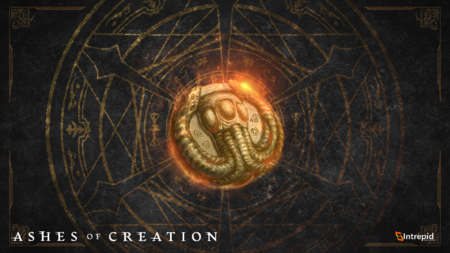
Let's say for example you have an event- that is the predicate for this event kicking off was that a raid boss was killed in a nearby dungeon; and it was killed for the 50th time, or it was killed by some particular storyline end or whatever the predicate system is in the world state to say "hey kick this event off". Well, when that event kicks off a number of spawners activate around the node and NPCs start moving towards a node. The node is notified, like "hey there's something happening here, you guys should put up your defenses focus on this thing"; and those with monster coins who are within the area and are not a citizen of the node or an affiliated node can choose to activate the monster coin to become one of the monster types that exist within that event; and that event has a number of targets; and let's say for this particular story arc the thing was we need to find artifacts and better weapons in order to defeat these bosses at the bottom of this dungeon; and a lot of players went through that process they found those weapons and whatnot. Well those things might be stored in three buildings that exist within the node. They might be stored within the armory; they might be stored within the barracks; and they might be stored at a workshop that has access to a workbench that they've chosen to build and that could also potentially serve as a predicate; and when you become the monster those are your three objectives; and you don't need to destroy all three. You potentially just need to destroy one, or you destroy as many as you can if it's a time selected event; and you might have targets that are NPC-related as well, such as the blacksmith that's at the workbench, or the captain of the guard who's at the barracks, or whatever who's at the armory; and you get to go in and you get to kill other players potentially during this who are helping to defend the city; and you can also make it to the objectives and potentially help in destroying the building, or killing the NPCs. That is the type of objectives that would exist within a monster coin system for an event.[64] – Steven Sharif
Sometimes the disturbed beings could take the form of packs of dire wolves, hordes of zombies roused from their graveyard, or even, rarely, an epic-tier dragon flying out of a volcano once a node reaches its maximum level. In any case, the disturbed monsters have to tackle a series of destructive objectives, which can either be handled by the AI or, more interestingly, by a player. The player in turn would attempt to complete all those actions much as in a multi-objective quest, hopefully before other players brought him or her down.[66]
Monster coins enable players to play as monsters within the monster coin event system. This ranges from playing as a horde of zombies, to becoming a massive dragon.[67][68][69]
- During a Monster Coin Event, players will be able to activate Monster Coins, allowing them to become monsters and wreak havoc! These Events can be triggered in a variety of different ways, and in some cases they may even provide cosmetic rewards.[63]
Monster coin events are system spawned events.[68][70]
- They are structured in a way to prevent groups from gaming the system.[70]
- Monster coin events are triggered by activity in the world, such as node advancement, defeating a boss or constructing certain types of buildings within a node.[71]
- Server messages appear for players in the vicinity of these dynamic events.[72]
- The player will have a number of potential objectives they can choose to attack during the event. This may include node buildings, points-of-interest, dungeon, NPC, or other open-world objective.[64]
- When you're playing as a as a monster from the monster coin use as part of an NPC event that might be targeting a node, or other some other open-world objective or POI, or dungeon, you get to participate as a monster and your focus is completing objectives that have already been prescribed as part of the event.[64] – Steven Sharif
- Drop tables are disabled for player controlled monsters.[73]
- Monster coins only allow a character to participate in events on their own server.[74]
- NPC hate lists do not affect monster coin events.[64]
The Ancients are not going to be part of the monster coin system.[75]
- Traditionally, the Ancients are not going to be part of the Monster Coin system. These are the primary antagonists of the story. From a lore perspective, and one of the reasons why they're not a part of the Monster Coin system, is because their souls have really developed almost to the point of perfection in manipulating the Essence for more corrupt uses. They haven't quite gotten there, and who knows if they ever will, but that attunes them out of the possibility: The reason why the monster coin system is possible with other creatures.[76] – Steven Sharif
Corrupted areas
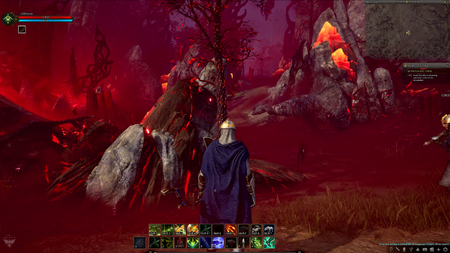
We just saw a corrupt zone and that zone becomes corrupt after a period of time in which players are not addressing some issues that arise through certain events or through certain story arcs; and that corruption can spread and corruption changes the spawners for resources and for monsters; and that has a fundamental effect on the resource economy of the game.[78] – Steven Sharif
Corrupted areas (zones/points of interest) can dynamically evolve with the progression of nodes and story arcs.[78][79][80][81][82][83][84]
- Harbingers that exist on Verra as dungeons are where The Ancients are capable of pushing into the material plane. They can continue to do so under the guise of the effects of corruption as it spreads.[85]
- These are sources of NPC events that players need to address before they grow out of hand.[78][86][83]
- Players need to participate in these events to stop the spread of corruption and hold back the intrusion on the material plane.[78][85]
- If players fail to address these corrupted areas, the frequency of NPC events against their node will increase. These can lead to node buildings and services being disabled, increasing the node's vulnerability to node sieges.[87]
- It can be a very detrimental thing if corruption is not addressed; and that's the intent of corruption, is to present a challenge to the players that if not addressed it becomes exacerbated and a problem over time.[87] – Steven Sharif
- Corrupted areas do not confer corruption onto a player. Only PvP related activities lead to player corruption (in the flagging system).[88][89]
- To degree your mortal coil, as we call it, or what some might consider a soul from your character's perspective within this story- can be influenced and can be changed into a shape that's more in tune with corruption; and that's through doing PvP things you can accomplish that.[88] – Steven Sharif
- When it enters the corruption state outside of weather, in that corrupt state, you will probably see a little bit less of the influence of the season because really it's adopting that corruption, which in-and-of-itself is a season.[90] – Steven Sharif
- Corrupted areas will spawn variations of mobs and resources.[78]
- Corrupted resources are only available in corrupted areas or during certain story arcs.[78][79][91][92][93]
Adaptive content

This is actually a dynamic POI. This one will evolve as players evolve the node that it's attached to. So this is its final state.[94] – Jeffrey Bard
New points of interest (such as dungeons, world bosses, and corrupted areas) spawn as nodes develop.[84][95] This content adapts to the node progression of the zone it is in.[94][96]
- Additional buildings will spawn.[94]
- Additional mobs will spawn.[94]
- Different antagonists/leaders with different story lines.[94][96]
- Populations will change.[96]
- Content difficulty will change.[96]
- The content may be different altogether.[96]
- Additional quest hooks.[94]
- Dungeons will be unlocked when certain nodes advance to certain stages.[97]
- Drop tables in areas and dungeons will be tied into the progression of certain areas.[97]
- POI events are events that relate to specific points-of-interest (POI).[100]
- The location of points of interest will be the same on each server, but some servers may have limited or no access to them.[101]
- Certain dungeons and other points of interest across the map will all be affected by the server’s node development. Some dungeons will only be unlocked if nodes are developed to certain stages. The storyline objectives for players inside dungeons will also be dependent on the story arc paths chosen through the node system. The drop tables in area and dungeons will also be tied into the progression of certain areas. For example, let’s say that the humans have developed a node in Region A, and a storyline has opened up that leads players to inspect the ruins (dungeon) of a nearby area. And let’s say that this node was developed in a scientific (crafting) zone… Well before the node developed, this dungeon was accessible… But now the dungeon has propagated new monster assets that include a drop table catering to a crafting emphasis because of the development of that academic node. And perhaps, a new boss appears in different rooms of the dungeon that includes different adventure quest starts, like a mysterious item with a storyline that can only be progressed if a node develops to the metropolis stage in a certain region, across the world. Our system is so vast, when it comes to interconnectivity and how the world reacts to the players.[97]
Player driven narrative
One of the major goals I feel like we have is to allow player decisions to have consequences and to have meaningful results from the decisions that they make, so it seems like people can really create their own stories.[102] – Aimi Watanabe
The world of Verra will be the same on each server, but Nodes will develop differently. Different servers will have different narratives. Things that happen on one server may not happen on another.[103]
- The overarching narrative of Ashes of Creation is that players are the returning children of Verra but they will not be characterized individually as "saviors".[104]
We want as many people as possible to experience the main server Narrative. These will branch at different scales, but largely at the personal level. Where things change is at the Node level – different parts of the story will be unlocked based on where and when Nodes grow. Unlocking a part of the story in a certain way locks out progression of the story in a different way. You’ll see different antagonists, different NPCs, and different calls to action depending on what’s happening with the server at that time.[105]
It redefines what the players will experience in an MMORPG to come into a wilderness that is devoid of really any structure outside of what the community creates themselves; and then what can be created can be changed, if they want to experience a storyline that's been seen on another server, but you're fighting a dragon because you're near a mountain and the other server's fighting a Kraken because they're near the coast and you want to fight that Kraken because of its drop table. If you want to meta it or because you just want that under your belt: to be the server first to take out that Kraken and you have yet to develop the node there, it's incumbent upon you to manifest that in the game.[106] – Steven Sharif
Artificial intelligence
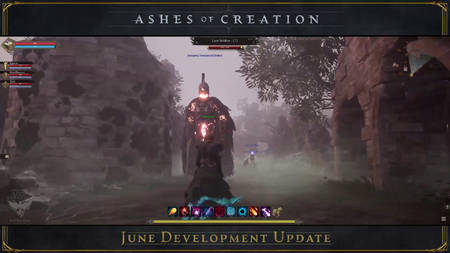
You can see how we utilize some of the different armor pieces- you've probably seen some of these pieces on different outfits like that toast Corvid Castigator cloak is on him.[107] – Margaret Krohn
Ashes of Creation utilizes an adaptive artificial intelligence (AI), meaning different encounters with similar mobs and bosses will yield different player experiences.[108][109]
- Some NPC AI behaviors may be randomly selected at the time of initial engagement causing them to make decisions dynamically during an encounter.[108][4][110][111]
- Higher frequency of AoE attacks depending on how many players are participating.[4]
- Unlock rage, recovery effects and buffs.[112][4]
- Supporting other monster types or classes nearby.[112]
- Additional adds and add classes.[4]
- Some NPCs may attempt to seek cover behind obstacles during encounters.[113]
- NPCs performing "idle actions" to make the world seem more alive has been discussed by the developers but is not confirmed.[114]
- Part of the NPC encounter design is not always going to be the same behavior tree. There will be purposefully behaviors that exist for the boss that are rolled at the time of the initial engagement; and so that is in an effort to keep things emergent, to keep things different, to try to not keep a static monotonous engagement idea.[108] – Steven Sharif
There are AI systems that don't relate to controlling NPCs.[115]
- There are some additional AI parameters that are set that don't relate necessarily to controlling NPCs. There are AIs with regards to the development of the borders for nodes in the direction and also the decisions that are made of which lower nodes to enslave as vassal states. There's AI that relates to a little bit of the stock market that's going to be present in the economy. There's some AI systems that are going to be announced also that are pretty innovative I think with regards to the MMORPG genre and that's going to make the triggered event system very interesting I think; and that's with regards to how nodes develop and the environment reacts to that development by spawning these triggered events of a horde of zombies attacking a city or a legendary raid boss coming out of the mountain. I think there's a lot of opportunity for some of the innovations that's been in the AI sector of game development too to come out in Ashes.[115] – Steven Sharif
Gameplay videos
- 2023-05-31 Video - Alpha Two Cyclops Combat Preview
- 2023-03-31 Video - Alpha Two Story Arc Systems Preview and the Lore of Carphin
- 2021-05-28 Video - Early Siege Gameplay in 4K
- 2021-04-30 Video - 4K - Alpha One Raid Boss - April Update
- 2020-10-30 Livestream
- 2018-02-09 Livestream
Visuals
2023-06-02 2023-06-01 2023-01-30 2022-10-31 2022-08-27 2022-07-02 2021-05-01 2021-01-30 2020-12-24 2020-11-09 2020-05-29 2020-03-28 2018-08-10 2018-02-28 2018-01-19 2018-01-19
See also
References
- ↑ Newsletter - June 2023.
- ↑ 2.0 2.1 2.2 Livestream, January 27, 2023 (1:34:06).
- ↑ 3.0 3.1 3.2 Interview, July 19, 2020 (14:51).
- ↑ 4.0 4.1 4.2 4.3 4.4 Interview, June 13, 2021 (22:20).
- ↑ Interview, July 19, 2020 (17:12).
- ↑ Livestream, November 30, 2023 (1:53:50).
- ↑ Livestream, May 27, 2022 (1:20:35).
- ↑ 8.0 8.1 Interview, July 9, 2023 (1:40:41).
- ↑ Podcast, May 11, 2018 (33:09).
- ↑ Ashes of Creation Forums - No participation trophy.
- ↑ 11.0 11.1 11.2 11.3 11.4 Interview, July 9, 2023 (1:43:38).
- ↑ 12.0 12.1 12.2 12.3 Podcast, April 11, 2021 (54:35).
- ↑ 13.0 13.1 Livestream, April 7, 2023 (1:15:02).
- ↑ Livestream, May 29, 2020 (1:33:11).
- ↑ Livestream, June 30, 2022 (1:18:55).
- ↑ Livestream, May 10, 2017 (14:45).
- ↑ Livestream, March 31, 2022 (1:19:41).
- ↑ Video, April 5, 2018 (49:36).
- ↑ 19.0 19.1 19.2 19.3 Livestream, December 19, 2023 (1:25:16).
- ↑ 20.0 20.1 20.2 Livestream, October 30, 2020 (33:26).
- ↑ 21.0 21.1 21.2 Podcast, April 23, 2018 (59:28).
- ↑ 22.0 22.1 Livestream, December 19, 2023 (1:23:00).
- ↑ Livestream, May 28, 2021 (1:13:05).
- ↑ Livestream, December 2, 2022 (1:05:51).
- ↑ 25.0 25.1 Interview, October 20, 2018 (2:40:17).
- ↑ Podcast, September 29, 2021 (30:04).
- ↑ Livestream, June 25, 2021 (1:05:01).
- ↑ Interview, July 18, 2020 (1:05:04).
- ↑ Livestream, February 9, 2018 (41:56).
- ↑ 30.0 30.1 Podcast, April 23, 2018 (1:01:01).
- ↑ Twitter - The way is shut! Trapped in this dwarven crypt.
- ↑ 32.0 32.1 32.2 Livestream, September 27, 2018 (43:21).
- ↑ Livestream, January 18, 2018 (16:34).
- ↑ Livestream, February 9, 2018 (4:42).
- ↑ 35.0 35.1 Livestream, June 1, 2017 (39:21).
- ↑ Livestream, May 22, 2017 (20:59).
- ↑ 37.0 37.1

- ↑ 38.0 38.1 Livestream, March 28, 2020 (1:48:36).
- ↑ Livestream, April 28, 2023 (1:15:22).
- ↑ 40.0 40.1 40.2 40.3 Livestream, April 30, 2020 (1:32:06).
- ↑ Alpha-1 map.
- ↑ Livestream, March 26, 2021 (39:08).
- ↑ Video, May 31, 2020 (1:40:18).
- ↑ Video, May 31, 2020 (1:17:42).
- ↑

- ↑ Podcast, April 23, 2018 (27:14).
- ↑ 47.0 47.1 47.2 47.3 47.4 47.5 47.6 47.7 47.8 Podcast, July 9, 2018 (22:24).
- ↑ Video, May 31, 2020 (17:20).
- ↑ 49.0 49.1 49.2 Interview, September 10, 2023 (28:15).
- ↑ 50.0 50.1 Livestream, May 31, 2023 (41:16).
- ↑ 51.0 51.1 Livestream, March 31, 2023 (1:20:41).
- ↑ Livestream, March 26, 2021 (54:26).
- ↑ 53.0 53.1 Livestream, May 31, 2023 (43:55).
- ↑ 54.0 54.1 Livestream, July 25, 2020 (46:08).
- ↑ 55.0 55.1 55.2 Podcast, August 4, 2018 (1:42:14).
- ↑ Livestream, November 19, 2021 (55:31).
- ↑ Livestream, May 31, 2023 (42:06).
- ↑ Livestream, May 31, 2023 (45:47).
- ↑ Livestream, April 7, 2023 (55:22).
- ↑ Livestream, March 31, 2023 (1:00:16).
- ↑ Livestream, October 28, 2022 (32:52).
- ↑ Livestream, June 1, 2017 (37:39).
- ↑ 63.0 63.1 Types of Events on Verra.
- ↑ 64.0 64.1 64.2 64.3 Livestream, July 29, 2022 (1:20:24).
- ↑ Video, May 25, 2017 (0:02).
- ↑ IGN: Ashes of Creation first look: An MMO that lets you be the boss.
- ↑ Livestream, June 30, 2023 (1:50:52).
- ↑ 68.0 68.1 Livestream, April 29, 2022 (39:00).
- ↑
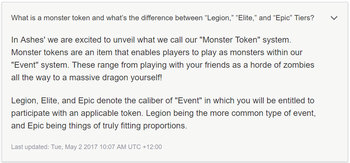
- ↑ 70.0 70.1

- ↑ Livestream, May 26, 2017 (22:19).
- ↑ Livestream, May 3, 2017 (36:25).
- ↑ Livestream, May 3, 2017 (35:25).
- ↑ Livestream, June 25, 2021 (1:36:05).
- ↑ Podcast, November 15, 2020 (47:12).
- ↑ Podcast, November 15, 2020 (51:22).
- ↑ Video, November 30, 2023 (29:26).
- ↑ 78.0 78.1 78.2 78.3 78.4 78.5 Video, November 30, 2023 (32:36).
- ↑ 79.0 79.1 Interview, July 9, 2023 (47:05).
- ↑
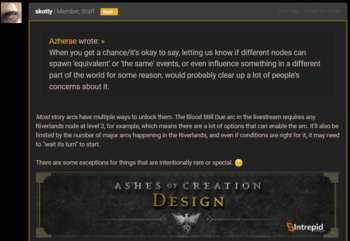
- ↑ Video, March 31, 2023 (1:22).
- ↑ Video, March 31, 2023 (3:32).
- ↑ 83.0 83.1 Livestream, March 26, 2021 (50:03).
- ↑ 84.0 84.1 Livestream, March 26, 2021 (22:53).
- ↑ 85.0 85.1 Livestream, November 8, 2020 (12:47).
- ↑ Livestream, June 25, 2021 (1:13:30).
- ↑ 87.0 87.1 Livestream, January 28, 2022 (1:17:12).
- ↑ 88.0 88.1 Livestream, March 31, 2023 (54:22).
- ↑ Livestream, June 25, 2021 (1:32:24).
- ↑ 90.0 90.1 Livestream, March 31, 2023 (58:27).
- ↑ Livestream, March 31, 2023 (59:10).
- ↑ Video, March 31, 2023 (16:42).
- ↑
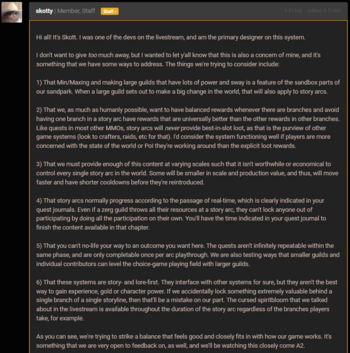
- ↑ 94.0 94.1 94.2 94.3 94.4 94.5 94.6 Livestream, March 26, 2021 (50:33).
- ↑ Livestream, November 17, 2017 (36:22).
- ↑ 96.0 96.1 96.2 96.3 96.4 Livestream, November 17, 2017 (18:29).
- ↑ 97.0 97.1 97.2 97.3 MMOGames interview, January 2017
- ↑

- ↑

- ↑ Livestream, April 29, 2022 (40:21).
- ↑
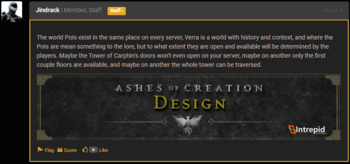
- ↑ Video, March 31, 2023 (28:11).
- ↑ Livestream, May 19, 2017 (37:03).
- ↑ Livestream, December 17, 2019 (1:10:30).
- ↑ Interview: Ashes of Creation on Building Their Virtual World, 2017-04-13.
- ↑ Livestream, May 22, 2017 (28:02).
- ↑ 107.0 107.1 Livestream, June 25, 2021 (21:24).
- ↑ 108.0 108.1 108.2 Interview, September 10, 2023 (34:51).
- ↑ About Ashes of Creation.
- ↑ Livestream, July 28, 2017 (43:57).
- ↑ Livestream, May 5, 2017 (11:55).
- ↑ 112.0 112.1 Livestream, July 29, 2022 (1:23:56).
- ↑ Livestream, February 25, 2022 (1:03:32).
- ↑ Livestream, 2018-04-8 (PM) (3:56).
- ↑ 115.0 115.1 115.2 115.3 115.4 Podcast, May 11, 2018 (24:23).

